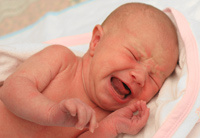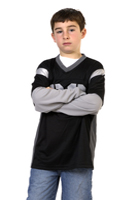What Conditions Are Particularly Well-Suited to Homeopathic Treatment?
There are few symptoms or conditions that could not be improved in some way with homeopathic care, and there are some situations in particular where homeopathy may be especially promising. The following is a brief and by no means exhaustive list of some of those clinical scenarios where homeopathy should be considered.
Individuals with allergies or intolerances to prescription medication
 Conventional medicine has many treatment protocols for specific illnesses or symptoms. However, not everyone can take the preferred medication, either because of side-effects, intolerance, or allergies.
Conventional medicine has many treatment protocols for specific illnesses or symptoms. However, not everyone can take the preferred medication, either because of side-effects, intolerance, or allergies.
This may create a situation in which an individual has no conventional treatment for their disorder. One solution for these people is to use another system of medicine. Homeopathy is a good one to consider because homeopathic remedies don't work on the material level and so are often an ideal fit for those who are very sensitive or intolerant of pharmaceuticals.
Children
Infants and children, all the way through adolescence, experience physical, mental, and emotional symptoms that can be indicators of stress, rapid growth and change, or even more serious illness. Some illnesses do mandate an intense management regiment that uses pharmaceuticals. But where possible, it seems prudent to minimize the use of pharmaceuticals and their risks and side effects in growing children.
Many minor childhood illnesses can be handled with homeopathy in a safe and gentle manner. Every parent should consider having basic first aid and acute care remedies in their medicine cabinet.
In challenges that healthy infants often face, including colic, diaper rashes, and teething, conventional pharmaceuticals may suppress symptoms, but they often recur when the drug is stopped. Homeopathic remedies may be able to enhance the self-healing capability of the body, so that the problem does not recur.
 Colic, for example, usually occurs in the child's first six weeks of life, and presents with fussiness, crying, and apparent stomach discomfort, often in the evening or nighttime. If dietary and feeding schedule changes don't help, a pediatrician might suggest sedatives or medicine to stop the spasms in the digestive system. But both of these types of medications have side effects, and so they are used minimally.
Colic, for example, usually occurs in the child's first six weeks of life, and presents with fussiness, crying, and apparent stomach discomfort, often in the evening or nighttime. If dietary and feeding schedule changes don't help, a pediatrician might suggest sedatives or medicine to stop the spasms in the digestive system. But both of these types of medications have side effects, and so they are used minimally.
Homeopathic remedies offer another option. The remedies have to be matched as closely as possible to the symptoms the child is exhibiting. Common remedies include: Colocynthis, Chamomilla, Magnesia Phosphorica, Aethusia, and Bryonia alba.
- Fever is another common occurrence in childhood that can often be treated safely, inexpensively, and naturally at home. Fever can be very uncomfortable for the child and scary for the parents, but it is actually an appropriate response by a healthy body to an acute infectious illness, and it helps to fight off the illness. A fever is an important sign that an illness exists, but should not be alarming in itself.
The most common remedies for acute childhood fevers are: Belladonna, Aconite, Pulsitilla, Ferrum Phosphoricum, and Bryonia Alba. As always, the remedy must be matched to the child's state.
Note that any prolonged fever of 103 degrees for more than eight hours should trigger an evaluation by a trained healthcare professional to determine the cause. Temperatures that rise rapidly or go above 104 degrees in a young child can sometimes trigger seizures, which are rarely dangerous themselves, but should always be evaluated by a trained healthcare professional. A child with a fever of more than 101 degrees for more than 24 hours without a known cause, or with neck stiffness, requires professional evaluation.Anti-fever medications, such as acetaminophen, lower the temperature, which may suppress the body's self-healing mechanisms. The appropriate homeopathic remedy helps the body's self-healing processes, and the fever will decrease naturally.
- Other common childhood illnesses that homeopathy can be effective with include coughs, colds, earaches, chicken pox, diarrhea, constipation, "tummy" aches, croup, pinkeye, skin rashes, and nosebleeds.
Pregnancy/childbirth/post-partum
 Many women during pregnancy experience symptoms that are painful or distressing, such as severe motion sickness, hemorrhoids, digestive upsets, back problems, headaches, and constipation. Homeopathic remedies present much less risk to the developing fetus than pharmaceutical interventions.
Many women during pregnancy experience symptoms that are painful or distressing, such as severe motion sickness, hemorrhoids, digestive upsets, back problems, headaches, and constipation. Homeopathic remedies present much less risk to the developing fetus than pharmaceutical interventions.
Homeopathy has been used to help reposition breech infants during the pregnancy. Some homeopathic preparations have been found to speed labor and to decrease complications. Other remedies can be used immediately after delivery to aid tissue healing.
You should consult with a homeopath to make remedy choice in all of these cases.
Emotional/behavioral spectrum of disorders, including ADD/ADHD and autism
The disorders along the spectrum from ADHD to Asperger's Syndrome to autism are being diagnosed with increasing frequency in our population for reasons not well understood. No conventional medical care is capable of reversing or eliminating the disorders, though drugs are commonly used to improve the management of these children, especially in school environments. In 1996, 7% of American school age children were on prescription stimulants. All of the drugs used, from stimulants (e.g. Ritalin) to sedatives, to antidepressants, have significant risks and side effects
 Another option is homeopathic interventions, because children who suffer emotional and behavioral problems may respond dramatically to homeopathic remedies. Indeed, in many chronic situations, the first response to a homeopathic remedy is often emotional or behavioral, even though that may not have been the primary complaint. Homeopathic treatment is designed to assist the body to self-correct, changing the underlying cause of illness.
Another option is homeopathic interventions, because children who suffer emotional and behavioral problems may respond dramatically to homeopathic remedies. Indeed, in many chronic situations, the first response to a homeopathic remedy is often emotional or behavioral, even though that may not have been the primary complaint. Homeopathic treatment is designed to assist the body to self-correct, changing the underlying cause of illness.
While these illnesses are no-doubt multi-factorial (genetic, environmental, situational, and social) and may require multifaceted approaches, homeopathy has been found to be very helpful for many of these children. For more information, read Ritalin Free Kids, by Judyth Reichenberg-Ullman, ND, and Robert Ullman, ND.
Infectious epidemics
Homeopathy has been used with a great degree of success in influenza and other epidemics for 200 years. In the 1918 flu pandemic, homeopaths reported around 1% mortality in their cases, while conventional doctors were losing 30% of their patients.
The current mainstay of flu treatment is prevention-using personal hygiene to prevent infection during outbreaks and immunization to try to help the body ward off the flu infection. Immunization may provide effective protection if a good vaccine is made early in the epidemic, however, viruses mutate quickly and immunizations lose effectiveness. And once a flu infection occurs, drugs offer only symptomatic relief. Complications, such as bacterial pneumonia, may be treated with antibiotics to help the immune system fight off that infection. But we don't really have anything in conventional medicine to stimulate the immune system itself to more effective action. Products such as Tamiflu have been shown to be ineffective with agents such as Avian flu.
Because homeopathic remedies never have a direct effect on the virus, resistance does not occur. Homeopathy modifies our body's response to a virus by empowering our natural defense mechanisms. With the increasing number of serious viral epidemics predicted, homeopathy may be one of the most available and cost-effective approaches for both personal and public health.
Anxiety and Depression
Homeopathic remedies can help manage the symptoms of anxiety and/or depression and reduce or eliminate the need for medication (and its sometimes serious side effects).
The goal of homeopathy in cases of anxiety and depression is to stimulate the natural healing response present in the individual and to support and strengthen all aspects of the person. In particular, homeopaths look at the factors that aggravate or improve the underlying problem or symptoms.
For example, an individual may experience anxiety preceding a particular event, or it may be an everyday occurrence. The anxiety may be due to fear, shyness, a lack of confidence, a lack of control, or to feelings of failure, rejection, and agitation. For others, anxiety might be stimulated by a change in their everyday routine. The cause and the symptoms particular to that individual will guide the practitioner in selecting a remedy that will elicit a healing response.
Likewise, the causes of depression are varied and particular to the person experiencing symptoms of depression. Whether the depression is situational, or a result of hormonal changes or other life-altering changes, the symptoms guide the practitioner to the remedy.
In treating people for anxiety or depression, homeopathy (as with pharmaceuticals) is often accompanied by other therapies, such as counseling/psychotherapy, mind-body practices, and nutritional modification.
Reference and Further Reading
Buegel, Dale, MD, Lewis, Blair, PA-C, Chernin, Dennis, MD, MPH (1991). Homeopathic Remedies for Health Professionals and Laypeople. Pennsylvania: Himalayan International Institute.
Homeopathy for Influenza website
Jonas, Wayne, MD, Jacobs, Jennifer, MD, MPH (1996). Healing with Homeopathy: The Doctors' Guide. New York: Warner Books.
Perko, Sandra (2005). The Homeopathic treatment of Influenza. San Antonio, Tex.: Benchmark Homepathic Publications.
Reichenberg-Ullman, Judyth, ND, Ullman, Robert, ND (2000). Ritalin Free Kids. New York: Three River Press.
Speight, Phyllis (1991). Homeopathic Remedies for Children. England: CW Daniel Co.
Winston, Julian (1999). Faces of Homeopathy. Tawa, Wellington, New Zealand: Great Auk Publishing.

